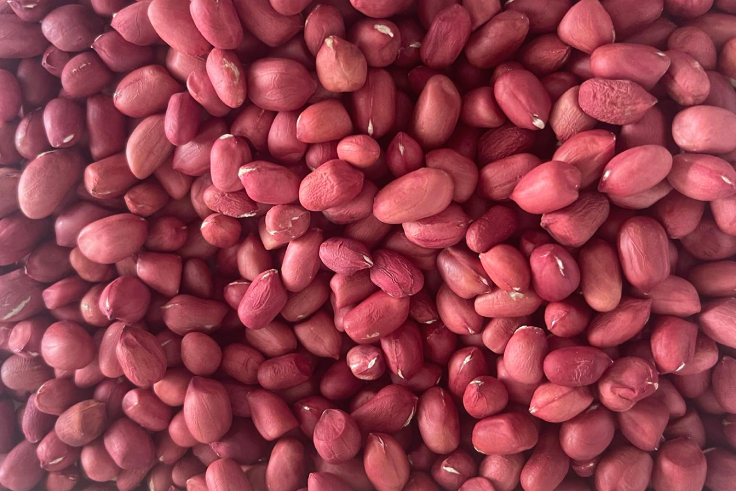Peanuts are known as 'ginseng' cereals, but what should you pay attention to when eating them?
Peanuts are a popular grain, known as "ginseng" because they have many effects in helping prevent cardiovascular disease and cancer.
Peanuts are a popular cereal, also known as peanuts in many regions. According to modern medical research, peanuts contain 3-5% water, 20-30% protein, 40-50% fat; 20% starch, 2-4% inorganic matter.
Peanuts are rich in nutrients, providing more than 30 essential nutrients and phytonutrients, are a good source of niacin, folate, fiber, vitamin E, magnesium and phosphorus. In particular, peanuts also contain the compound resveratrol, which has strong antioxidant properties, increases good HDL cholesterol, helps the circulatory system healthy, blood circulation good, and rosy skin.
Specifically:
Peanuts have the following effects:Increases energy, nourishes the body, lowers blood pressure, reduces blood fat and stops bleeding. The silk shell (the thin outer shell of the peanut kernel) has the effect of stopping bleeding, treating hemorrhage, and stimulating the spinal cord to produce platelets.
Stabilize blood sugar:A quarter cup of peanuts can provide your body with 35% of its daily manganese needs. Manganese is a mineral that plays a role in fat and carbohydrate metabolism, calcium absorption, and maintaining blood sugar stability.
Prevent gallstones:Peanuts have undergone 20 years of research, it has been proven that eating 28.35g of peanuts or peanut butter within a week will reduce the risk of progression of 25%gallstone disease.

Depression prevention:Peanuts are rich in the amino acid tryptophan, which is necessary for the production of serotonin. Serotonin is beneficial for the brain, helping to improve mood and reduce depression.
Enhance memory:Peanuts contain vitamin B3 and niacin which have many health benefits, including improving brain function and boosting memory.
Lower cholesterol:Nutrients that help boost memory power also help reduce and control cholesterol levels. In addition, these substances can also reduce bad cholesterol and increase good cholesterol, which is beneficial for the body.
Cardiovascular protection:According to many studies, regularly eating beans can reduce the risk of cardiovascular disease. In particular, peanuts are rich in unsaturated fats, which are good for the heart. Besides, they also contain powerful antioxidants, typically oleic acid. Eating a handful of peanuts four times a week can help you avoid cardiovascular disease as well as coronary artery disease.
Cancer prevention:Phytosterols found in abundance in vegetable oils, nuts, including peanuts, not only help protect the heart by limiting cholesterol absorption, but can also prevent cancer by inhibiting tumor growth.
Losing weight:Eating moderate amounts of peanuts and other nuts regularly may reduce the risk of weight gain. Previous studies have shown that people who eat nuts at least twice a week are less likely to gain weight.
Peanuts also help reduce the risk of birth defects:The folic acid contained in peanuts is essential for pregnant women. Many studies show that women who supplement 400 micrograms of folic acid daily before or during early pregnancy can reduce the risk of giving birth to a child with a neural tube defect by 70%.
According to Oriental medicine, peanuts have a sweet, rich, fatty taste and have the effect of strengthening the spleen, nourishing the stomach, moistening the lungs, promoting bowel movements, reducing phlegm, regulating blood and qi, reducing swelling, stopping bleeding, diuretic, increasing milk secretion, cooling the throat, reducing cholesterol, and anti-aging.
Peanuts are used to treat fatigue, exhaustion, and to relieve stomach aches. Combined with cinnamon and ginger, they relieve menstrual cramps. The stems and leaves are used to treat flatulence in the colon.
However, when eating peanuts you need to note the following 3 things:
First, do not eat moldy peanuts. Moldy peanuts contain aflatoxin. This toxin can cause direct food poisoning and is a carcinogen. Therefore, be careful when eating peanuts and peanut products, and make sure to choose safe products.
Second, people with allergies should not eat peanuts, which are a grain that can easily cause an allergic reaction. Symptoms include vomiting, diarrhea, angioedema (swelling), acute abdominal pain, severe eczema, asthma, and in the worst case, anaphylactic shock.
People with cold or diarrhea should not eat peanuts: Peanuts are good, but if you take too much, they can cause diarrhea or dry eyes, mouth, or nose. People with laxatives or loose stools due to cold and dampness should not eat peanuts.

